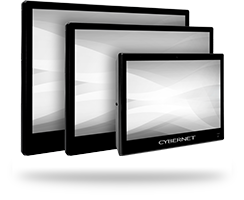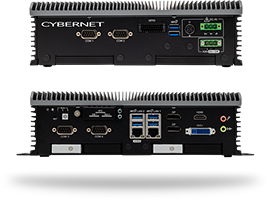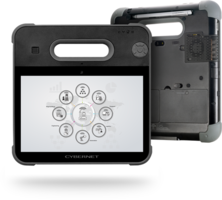Modern construction worksites are more than just concrete, steel, and hard hats. They are digital spaces using a wide range of computer-based tools, and need specialized construction computers to support them. Learn more about these rugged, reliable tools, and then view our construction computers to explore your options.
What is a Construction Computer?
As the name implies, a construction computer is a specialized computer built specifically for the construction industry. These devices are designed to endure the harsh working conditions found on a typical worksite, while still providing the processing power needed to enable digital tools that work crews rely on.
Panel PCs for Construction
Typically found in the on-site office or on larger machinery, panel PCs combine both a computer and a monitor into a single device. Industrial panel PCs are ideal for this role, as they are built to withstand threats common to construction worksites, such as harsh vibrations and dusty environments.
Mini PCs for Construction
Mini PCs are most frequently built directly into machinery or construction vehicles, providing computer support and precision to cranes, excavators, plows, and more. Similar to panel PCs, rugged mini PCs are built to be as robust as possible, while still providing plenty of processing power in a compact package.
Rugged Tablets for Construction
Given that construction sites frequently require workers to be on their feet all day, they need computers that can be mobile as well. Rugged tablets cover this role perfectly, as their large touchscreens provide an intuitive user interface, while their reinforced cases protect them from bumps and drops.
Requirements for Construction Computers
Unsurprisingly, the construction industry places a heavy requirement on its computers. The most important criteria for any construction computer are:
Durability
Rugged construction is the difference between a reliable electronic device and a very expensive brick made out of plastic, metal, and glass. All construction computers, regardless of their role, should be able to handle shocks and vibration, sudden impacts, and mishandling. This is especially important for tablets, as they are the most likely to be dropped or bumped into. Look for certifications such as IEC 60068 standards when shopping, as these standards help ensure a high degree of reliability.
Any device with a glass touchscreen, such as a tablet or panel PC, should also have protective measures. Chemically treating the screen’s glass to harden it and protect it against cracks and scratches is a necessity. A high ingress protection rating will also help protect the vulnerable circuits inside from dust and water.
Processing Power
While durability is a high priority, construction computers cannot afford to sacrifice computing power either. No matter what form they take, a construction computer should have a powerful CPU suited for business needs and capable of supporting even the most demanding programs and software, as well as plenty of RAM for multitasking. This will ensure that workers have the tools they need, no matter what those tools may be.
Connectivity
The issue of connectivity for construction computers applies to both wired and wireless connections. For wired connections, construction computers need to have a range of both modern and legacy I/O ports to ensure they can connect to and interact with other tools and machinery. For wireless connections, this means having reliable and powerful Wi-Fi receivers that can keep the device connected even while moving around the construction site.
Roles for Construction Computers
With all that said, what is a construction computer’s role? Some of the most impactful roles for these devices include:
Project Management
Even the simplest construction project can involve multiple disciplines and specialities. Laying concrete, shingling, plumbing, running electrical lines, and more need to work together without interfering or sabotaging each other’s efforts. While all this is going on, site managers also have to track work hours, financial reports, client communication, and more. By using project management software like Procore and Buildertrend on their construction computers, site managers can keep track of every little moving part they need to worry about.
Machinery and Vehicle Controls
Modern construction vehicles use computers to communicate with each other and manage their various processes. For example, some vehicles use computers as engine control units (ECUs) and transmission control units (TCUs) to better manage processes like ignition, fuel injection, and changing gears. They can also support programs like GPS, computer vision, wireless communication, and more, keeping vehicles and their operators better informed and better connected with the rest of the worksite.
Asset Management and Maintenance
Construction computers can work alongside other technologies such as RFID trackers and the Internet of Things to track the locations of machines, equipment, and people throughout the construction site. This keeps site managers informed on who and what is where, which contributes to worksite safety and helps prevent equipment loss.
Quality Control
One of the most critical aspects of construction is quality control. Throughout every step of the building process, equipment, materials, and structures must be thoroughly inspected to ensure they are free from flaws or assembly errors. Construction computers enhanced with computer vision programs can identify irregularities, such as cracks in concrete or manufacturing defects in rivets, letting construction crews correct these problems before someone gets hurt.
Communication and Collaboration
Any construction project requires constant collaboration between different experts and stakeholders. For some jobs, the company’s leadership may be hundreds, even thousands of miles away from the site itself. That’s why digital communication tools like video calls and computers with built-in webcams are so essential. Tablets are especially useful in this regard, as workers can easily carry them to specific parts of the worksite to give their off-site superiors a view of their progress.
Benefits of Using Construction Computers
The power, connectivity, and flexibility that construction computers offer bring several critical advantages.
Greater Efficiency
First and foremost, computer support can make everything at a construction site faster and more efficient. From greater precision for controlling vehicles to better management for employees and equipment, there’s virtually no area where computer support can’t improve operations. Even something as simple as having a computer equipped with machine vision tools to double-check people’s work can help prevent errors and save money in the long run.
Easier Collaboration
The construction industry intersects with multiple disciplines and often requires input from extremely high-demand specialists. By implementing computer-based communications and teleconferencing, construction workers can confer with their superiors and consult with experts without needing them to travel to the site itself.
Better Worksite Safety
Keeping workers safe is a top priority for any responsible site manager. Construction computers can help in this pursuit on multiple fronts. Computer vision software can detect if areas are safe to enter and if workers are wearing proper PPE, while RFID trackers can alert workers if they wander into unsafe sections of the worksite. These measures prevent worksite injuries and accidents and keep work progressing on schedule.
Construction Computers from Cybernet Manufacturing
While construction places a high strain on any electronic device used in the industry, dedicated construction computers can meet the challenge and exceed it, giving workers better control over their workflows and keeping them safe throughout their shift.
If your company is looking for powerful, effective computers for its worksites, contact the team at Cybernet Manufacturing. We’d be happy to explore how our devices can be used to enhance your business. Our qualifications as an original equipment manufacturer let us customize our products to fit your specific needs, and our dedication to quality ensures our devices have a failure rate below 0.5%.


